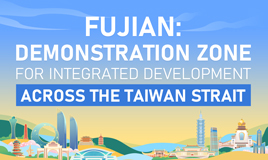Fujian people embrace better life
During the 13th Five-Year Plan (2016-20) period, Fujian province has substantially improved people's livelihoods and quality of life on the backdrop of rapid economic growth.
The province has greatly improved its elderly care service by setting up a system that combines medical treatment with health care. Elderly care services now cover 70 percent of urban communities and villages in the province, with the total number of elderly care institutions and facilities reaching 14,000, an increase of 120 percent over the end of the 12th Five-Year Plan (2011-15) period.
Over the past five years, Fujian has comprehensively implemented unified standards for subsistence allowances for both urban and rural residents, and this has in turn raised people's living standards from bare subsistence to moderate prosperity.
The average standard of subsistence allowances for urban and rural residents in the province was raised from 5,736 yuan ($897.68) per year and 3,406 yuan per year at the end of 2015 to the current 8,260 yuan per year, an increase of 44 percent and 143 percent respectively.
Voluntary services and charitable organizations have also developed rapidly in Fujian province.
A total of 32,700 social organizations have been registered in the province, and the number of social workers has increased from 15,000 at the end of 2015 to the current 47,000. Over 5.16 million people -13 percent of Fujian's population - are registered as volunteers. Over the past five years, charitable organizations in the province have raised more than 12 billion yuan in funds that have benefited 8 million people.
To boost the economic and social development of old revolutionary base areas in Fujian, the province has also created a pairing-up aid mechanism between social organizations and old revolutionary base areas through measures including financial assistance and agricultural production cooperation.
To date, 1,232 social organizations in the province have signed agreements with 1,263 villages in old revolutionary base areas to carry out pairing work in fields such as industry, employment, consumption, skill training, and public welfare.




